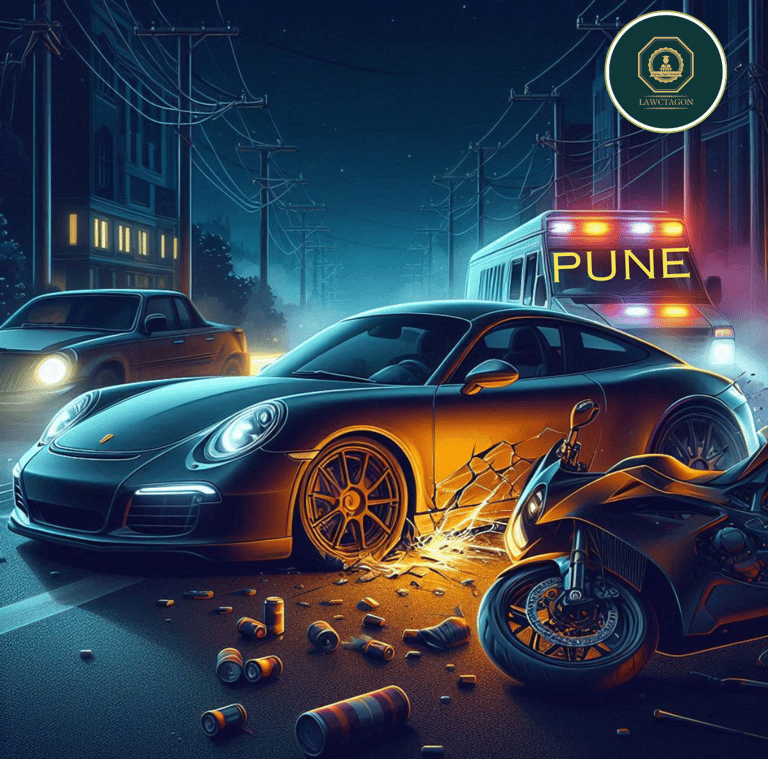Justice and Privilege: Lessons from the Pune Porsche Tragedy
In this blog, the author discusses the tragic incident involving Vedant Aggarwal, highlighting issues of underage drinking, reckless driving, and legal privilege. The article delves into the legal proceedings, public outcry, and the urgent need for systemic reforms to ensure justice and societal safety.
Abhinav
6/6/20245 min read


Justice and Privilege: Lessons from the Pune Porsche Tragedy
A Night of Recklessness: The Tragic Story of Vedant Aggarwal's Fatal Mistake
For 17-year-old Vedant Aggarwal, May 18, 2024, began like any other night. He started a wild night out with his friends, going to Cosy Bar and then the Black Club. They were underage, yet the bars served them alcohol that violated the law and common safety precautions. With each drink the group consumed, their inhibitions decreased as the evening went on. The consequences of being drunk, as well as the sense of invincibility that frequently comes with youth, gave Vedant confidence and he made a decision that would change his life and the lives of others forever.
The early hours of May 19th saw Vedant get behind the wheel of his father's luxury Porsche Taycan. Neglecting the fact that he lacked a valid driver's license, he headed out onto the streets of Kalyani Nagar and accelerated through the winding lanes. On empty roads, the Porsche, without a license plate, was driven carelessly. Regrettably, his reckless actions would soon lead to disastrous consequences.
The speeding Porsche struck a two-wheeler, instantly robbing them of their lives. IT specialist Ashwini Koshta died instantly. After hurrying Aneesh Awadhiya, 2nd IT worker, to the hospital, his injuries were too serious, and he passed away too soon, leaving a void in his family that can never be filled.
The authorities took Vedant into custody.
Police quickly took Vedant, who was still intoxicated, under custody. The first investigations revealed shocking information, including the fact that Vedant, a minor, was driving without a valid license and that the Porsche did not have a proper number plate. This episode took the country by storm, drawing attention to the risks of underage drinking and careless driving, as well as the inadequate enforcement by businesses that condone such conduct.
Privilege and Justice: Vedant Aggarwal's Controversial Bail
Vedant's grant of bail just 14 hours after his arrest marked a far more unexpected turn in the case. A massive public outcry over this controversial ruling included anger and disappointment that Vedant's privileged upbringing was the reason for the legal system's leniency. Many questioned whether the juvenile justice system's leniency is excessively gentle, particularly in situations involving major crimes.
Vedant faced serious charges.
After the matter grew out of proportion and political pressure increased, a second look at his offence was taken and the appropriate charges were framed. This includes culpable homicide that does not amount to murder (Section 304 of the IPC). Section 279 of the IPC prohibits rash and negligent driving. An act endangering life causes grievous harm (Section 338 of the IPC). Section 185 of the Motor Vehicles Act prohibits driving while under the influence of alcohol. Section 177 of the Motor Vehicles Act prohibits possession of an invalid license.
The Juvenile Justice Act charged his father, Vishal Aggarwal, with wilful neglect of a child (Section 75) and supplying intoxicating substances to a minor (Section 77). Vedant's mother, Shivani Aggarwal, faced charges of tampering with evidence by allegedly swapping the teen's blood samples with her own.
Vedant’s first bail conditions
Vedant’s first bail conditions were ridiculous, preposterous and outrageous. He was asked to write a 300-word essay on traffic safety and help out the traffic police. This sparked worries about the fair application of the law, regardless of financial situation. Many questioned the first bail condition, which called for Vedant to compose a 300-word essay on traffic safety, stating them as inadequate. Legal experts cite this as an example of how the wealthy and powerful can exploit loopholes and escape consequences. One significant factor in this decision was the Juvenile Justice Act, which makes bail a right for minors.
Another significant issue was the improper application of the laws prohibiting underage drinking. Several places served alcohol to Vedant and his friends, despite their minor status. This gap underscores the need for strict enforcement to curb underage drinking and its potential consequences.
The Juvenile Justice Board placed Vedant in an observation home and revoked his bail in the midst of a public outcry. Still, as the more extensive legal processes drag on, this is only a temporary solution. If the police succeed in having him tried as an adult, Vedant could face far harsher penalties. The process of trying a minor as an adult is difficult, though, and has stringent requirements that the wealthy frequently take advantage of.
This case highlighted the shortcomings of the current legal system and underscored the urgent need for changes to guarantee the equitable application of the law to all individuals, irrespective of their age or financial status.
Whether to trial 17-year-old Vedant Aggarwal as an adult or a minor is one area of the case that has generated intense discussion. The Juvenile Justice Act seeks to safeguard and rehabilitate young people, but occasionally the seriousness of the offence calls for an exception.
While the case is going on at the time of publication of this blog, here are a few points this case re-highlighted.
Unravelling Privilege and Demand for Accountability are still prevalent in Judiciary
The Vedant Aggarwal case has ignited a firestorm by exposing claims of privileged treatment and potential malpractices to the forefront. This case begs important concerns about the impact of money and power on the legal system, from the original charges to the delays in gathering important evidence.
The charge of Vedant under Section 304A (causing death by negligence) rather than the more serious Section 304 (culpable homicide) was, according to critics, a conscious attempt to minimise the seriousness of the offence. This, together with the contentious decision to release him on bail in less than 14 hours, provoked public resentment and accusations of preferential treatment because of his wealthy upbringing. "The lenient treatment meted out to the accused is a glaring example of how the legal system often favours the wealthy and influential," said Maharashtra's Leader of Opposition, Jayant Patil.
Why people don’t trust the legal system
As the inquiry progressed, additional troubling information came to light, further eroding public trust in the legal system. There have been accusations that medical personnel withheld Vedant's blood samples, jeopardising important proof of intoxication. Unbelievably, reports said that Vedant's mother, Shivani Aggarwal, was detained for allegedly substituting her son's blood sample with her own blood samples, obstructing justice and protecting him from legal repercussions.
In a First Information Report (FIR), the family's driver also claimed he was unfairly imprisoned and under pressure to accept responsibility for the accident. This makes it clear how far powerful people will go in order to fabricate a story and avoid responsibility.
Prevention and Effects on Society
The effects of tragedies like the Pune Porsche accident extend far beyond the immediate victims and their families. They sour public trust in the judicial system and cast doubt on the effectiveness of current legislation in discouraging careless conduct. By trying Vedant as an adult, the legal system would powerfully convey that actions have consequences and that the safety and well-being of society at large are paramount.
Capacity for Rehabilitation
Justice for All: Urgent Need for Legal Reform
This case has ignited a firestorm of outrage and debate, exposing several deep-rooted societal issues that demand urgent attention. This terrible event, with underage drinking, careless driving, and the effect of privilege, emphasises the necessity of thorough systemic changes and more stringent law enforcement.
Conclusion
Finally, the Vedant Aggarwal case highlights the pressing need for societal and legal reforms. It has clarified enduring problems, including underage drinking, careless driving, and the impact of privilege on the administration of justice. As we consider this tragedy, it is evident that preventing future occurrences of this kind requires closing legal loopholes, guaranteeing equal application of the law, and putting in place extensive reforms. We need to come together now more than ever to push for the necessary reforms to our legal system and society as a whole. Let's utilise this dreadful incident as a catalyst for positive transformation, ensuring justice prevails and everyone resides in safer communities.


